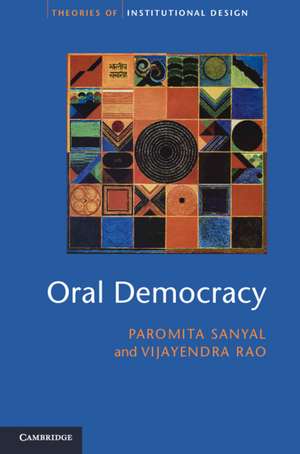Oral Democracy: Deliberation in Indian Village Assemblies: Theories of Institutional Design
Autor Paromita Sanyal, Vijayendra Raoen Limba Engleză Hardback – 19 dec 2018
Din seria Theories of Institutional Design
-
 Preț: 284.56 lei
Preț: 284.56 lei -
 Preț: 323.05 lei
Preț: 323.05 lei -
 Preț: 152.08 lei
Preț: 152.08 lei -
 Preț: 288.80 lei
Preț: 288.80 lei -
 Preț: 283.41 lei
Preț: 283.41 lei -
 Preț: 284.78 lei
Preț: 284.78 lei - 14%
 Preț: 937.61 lei
Preț: 937.61 lei -
 Preț: 284.01 lei
Preț: 284.01 lei -
 Preț: 289.57 lei
Preț: 289.57 lei -
 Preț: 285.75 lei
Preț: 285.75 lei -
 Preț: 282.48 lei
Preț: 282.48 lei -
 Preț: 306.10 lei
Preț: 306.10 lei -
 Preț: 268.89 lei
Preț: 268.89 lei -
 Preț: 305.71 lei
Preț: 305.71 lei -
 Preț: 285.93 lei
Preț: 285.93 lei -
 Preț: 287.48 lei
Preț: 287.48 lei -
 Preț: 203.28 lei
Preț: 203.28 lei - 11%
 Preț: 694.71 lei
Preț: 694.71 lei -
 Preț: 281.49 lei
Preț: 281.49 lei -
 Preț: 280.53 lei
Preț: 280.53 lei -
 Preț: 281.49 lei
Preț: 281.49 lei - 25%
 Preț: 518.31 lei
Preț: 518.31 lei
Preț: 516.21 lei
Preț vechi: 688.29 lei
-25% Nou
Puncte Express: 774
Preț estimativ în valută:
98.77€ • 103.41$ • 81.73£
98.77€ • 103.41$ • 81.73£
Carte indisponibilă temporar
Doresc să fiu notificat când acest titlu va fi disponibil:
Se trimite...
Preluare comenzi: 021 569.72.76
Specificații
ISBN-13: 9781107019744
ISBN-10: 1107019745
Pagini: 224
Dimensiuni: 157 x 235 x 16 mm
Greutate: 0.45 kg
Editura: Cambridge University Press
Colecția Cambridge University Press
Seria Theories of Institutional Design
Locul publicării:New York, United States
ISBN-10: 1107019745
Pagini: 224
Dimensiuni: 157 x 235 x 16 mm
Greutate: 0.45 kg
Editura: Cambridge University Press
Colecția Cambridge University Press
Seria Theories of Institutional Design
Locul publicării:New York, United States
Cuprins
1. Introduction; 2. Discursive political culture; 3. Political construction, state enactments, and citizen performances; 4. The role of literacy in deliberative democracy; 5. Conclusion: oral democracy.
Recenzii
'Using a detailed analysis of gram sabha deliberations in over two hundred villages bordering four states, this book provides a rich picture of participatory grassroots democracy in South India. Instead of the usual preoccupation with quantitative indicators of service delivery outcomes, Rao and Sanyal focus on development of civic capacity, engagement between civil society and state officials, and political legitimacy of the state, and how these vary with historical inequality, literacy and state policy.' Dilip Mookherjee, Director of the Institute for Economic Development, Boston University
'This valuable book documents the diverse voices from the ground that form the body and soul of everyday democracy in action. It serves as a crucial reminder to urban readers that the the real crucible of Indian democracy is not the quinquennial Election Day, but the messy, contested terrain of gram sabhas, where citizens ask questions, demand answers, and help make decision-making responsive and reflexive.' Ashwini Deshpande, Delhi School of Economics
'In Oral Democracy, Sanyal and Rao engage in a detailed comparative analysis to illuminate how local state capacity and literacy influence the extent to which an institutionalized system of public collective deliberation (gram sabhas) contributes to the transformation of the practice of citizenship in contemporary India. This rigorous analysis produces a pathbreaking contribution to our understanding of political culture outside the West. Their book should be widely read by social scientists who wish to better understand the broad institutional context in which the poor defend their dignity in an extraordinarily unequal society.' Michele Lamont, Director of the Weatherhead Center for International Affairs, Harvard University and author of The Dignity of Working men
'This valuable book documents the diverse voices from the ground that form the body and soul of everyday democracy in action. It serves as a crucial reminder to urban readers that the the real crucible of Indian democracy is not the quinquennial Election Day, but the messy, contested terrain of gram sabhas, where citizens ask questions, demand answers, and help make decision-making responsive and reflexive.' Ashwini Deshpande, Delhi School of Economics
'In Oral Democracy, Sanyal and Rao engage in a detailed comparative analysis to illuminate how local state capacity and literacy influence the extent to which an institutionalized system of public collective deliberation (gram sabhas) contributes to the transformation of the practice of citizenship in contemporary India. This rigorous analysis produces a pathbreaking contribution to our understanding of political culture outside the West. Their book should be widely read by social scientists who wish to better understand the broad institutional context in which the poor defend their dignity in an extraordinarily unequal society.' Michele Lamont, Director of the Weatherhead Center for International Affairs, Harvard University and author of The Dignity of Working men
Notă biografică
Descriere
Studies citizens' deliberation on governance and development in Indian democracy, and the influence of state policy and literacy, analysing three hundred village assemblies. This title is also available as Open Access.
